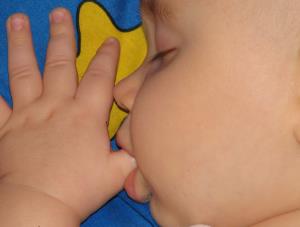
Occupational therapist Meg Faure runs The Infant and Toddler Support Centre in Cape Town and is co-author, with Ann Richardson, of Baby Sense and Sleep Sense. About 80% of the babies and toddlers she sees in practice have sleeping problems.
Meg says, “Sleep is an extremely complex area of development and there are myriad reasons why babies wake at night, or don’t have healthy sleep habits. The Baby Sense method differs from more harsh approaches because it’s gentle. Sleep training is only advised once many other variables are ruled out. Often if these are dealt with, many babies will sleep through the night without being ‘sleep trained’.”
Some babies may need to learn new methods to fall asleep and may, as a result, be upset while learning how to re-settle themselves. In these cases, Meg suggests that parents shouldn’t leave their babies at all, but rather sit with them, helping them to access new methods to self-soothe.
The Baby Sense method usually lasts 4 to 7 days and most babies sleep through the night thereafter.
The first step in sleep training your baby is to rule out the basic reason underlying her night waking.
8 issues to consider:
- Unrealistic expectations Have age-appropriate expectations and understand the stages your child passes through when sleeping. Young babies should not be sleep trained.
- The sensory environment and experiences have a great impact on sleep, and need to be addressed to facilitate good sleep habits. In other words, babies cannot be expected to go from a busy game of tickle with dad straight into bed without some calm time before she tries to sleep.
- The sleep spaceThe environment in which your baby sleeps is essential for good sleep. Make sure the room is not too hot or cold, and that her blankets are suitable for her age, stage and the season.
- Nutritional needsVery young babies will wake for hunger but as they get older, they no longer need to feed at night and waking up will either be out of habit or for a different reason entirely. Babies have different nutritional needs at different ages too. Very often adding more protein and iron to the diet does the trick. It’s vital that these nutritional needs are dealt with before you can even contemplate sleep training.
- Health factors If your baby is sick or uncomfortable, she won’t sleep well and may wake during every light sleep state. Before embarking on a sleep programme, your baby should get a clean bill of health from a doctor.
- Day sleeps are essential for night sleep to develop well.
- Self-soothing skills Babies need to be able to self-soothe in order to fall asleep and settle back to sleep during the night. Take the time to establish a soothing strategy with your baby.
- Emotions The emotional aspect of sleep can’t be ignored. Separation anxiety, for instance, can be very real and will impact on sleep. Take note of this and work around emotional reasons for your baby’s sleep problems.
In essence, only once these areas are dealt with in great detail, can you proceed to coach your baby to sleep independently.
Here are the steps:
- Meg and Ann suggest that at 6 months, you can leave your baby to niggle (not full-blown crying) for no more than 5 minutes. This will allow her time to settle by herself if she can. If she does not settle, use soothing strategies such as placing a hand on her back and patting her or giving her a dummy, teddy or comfort object.
- Stand next to her cot, talk to her in soothing tones or stroke her gently.
- If she does not calm down, pick her up, rock her gently and put her back down when she’s drowsy, but not asleep.
- If she cries once you have left the room, allow another five minutes for her to self-soothe and go to sleep on her own. If she does not settle in this time, return to her room and talk to her reassuringly, or gently stroke or pat her back.
- If crying persists, you can either stay in the room and place a firm hand on your baby’s back to reassure her or leave the room, returning in intervals of 1, then 2, then 4 and 6 minutes, increasing the interval by 2 minutes each time. If your baby becomes hysterical, she may need to be picked up, but put her down once she’s drowsy.




 Publications
Publications
 Partners
Partners














